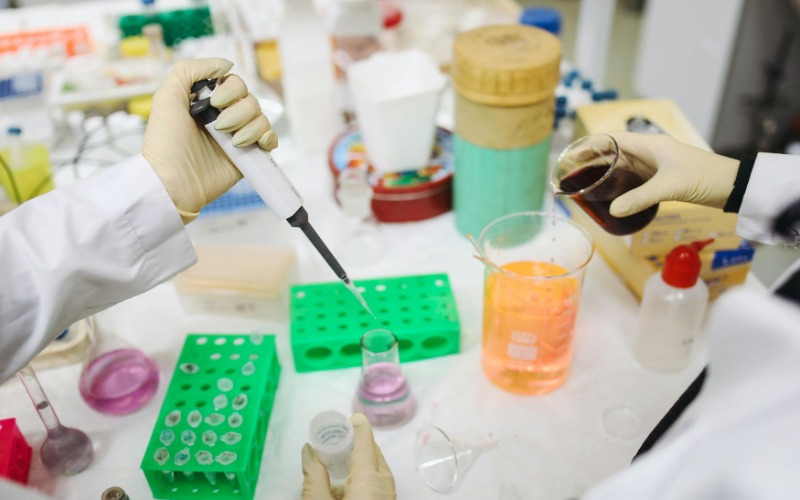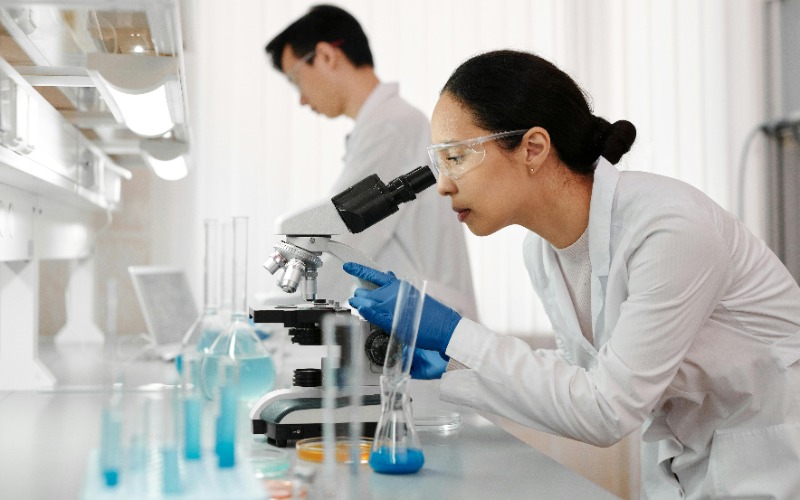How is AI revolutionizing drug discovery?

AI-based drug discovery helps researchers develop life-saving treatments with less time, money and resources. Pharmaceutical researchers use AI to help with many tasks, such as drug testing and data analysis. Using AI in the drug development process significantly reduces the time it takes to identify new treatments and bring them to market. How does AI drug discovery work and how is it changing the industry?
How AI drug discovery works
This technology has been around for several years but has only recently become widely recognized. A team of Australian researchers from Flinders University announced the first AI-developed vaccine in 2019. A year later, in 2020, AI was instrumental in creating COVID-19 vaccines that save lives.
What makes AI such a revolutionary tool for developing such vaccines? Algorithms have specific strengths, including pattern recognition and automation of repetitive processes. Both are invaluable in drug discovery, especially in the early stages.
When researchers try to identify new treatments, they must examine thousands of possible combinations of chemicals, compounds and proteins. Identifying a few promising drug candidates using conventional methods can take months or even years. Even then, researchers risk missing many possible treatments that don’t show clear signs of potential.
Fully automated initial selection
AI can completely automate this initial selection process. Machine learning models trained to understand the relationships between different chemical compounds can quickly analyze thousands of possible drugs.
This is far more effective than conventional methods – a major advantage for pharmaceutical companies and researchers. 40% of executives say operational efficiency is one of the key benefits of digital transformation, which includes the adoption of AI, robotics and similar technologies.
Not only is AI drug discovery much faster, it can also reveal potential treatments that may have gone unnoticed. This is due to the way AI approaches drug discovery. Algorithms analyze potential drugs from a data perspective, looking for trends, patterns and digital connections. Using this approach, AI identifies a set of promising drug candidates that a human researcher can screen for.
AI-powered simulations and modeling
After identifying potential treatments, AI continues to contribute to drug discovery. This is an excellent tool for modeling and testing new drugs in a virtual environment. Numerical modeling and simulations help researchers better understand the behavior of a new drug candidate before developing it for clinical trials.
AI neural networks can safely simulate the reactions of new drugs with the human body. AI models many possibilities simultaneously, highlighting potential drug behavior, possible complications, long-term effects, and potential side effects. There are a few key benefits to using AI in this preliminary testing process.
First, a well-developed AI simulation model can minimize the need for animal experimentation. Since AI will likely identify harmful side effects of a new drug candidate, researchers will be able to abandon dangerous effects before the animal testing phase begins. With AI testing, drugs are effectively further along in the discovery and development process by the time they reach the animal testing phase.
Sufficiently advanced AI testing may even eliminate the need for animal testing. The FDA Modernization Act 2.0 – passed in December 2022 – allows computer modeling to replace animal testing for new drugs. Thus, the adoption of AI in the drug discovery process can make new life-saving medical treatments safer and more ethical.
Additionally, AI simulations allow researchers to identify risky drug candidates earlier. Researchers can save time and money by identifying the most promising candidates and filtering out those with high risk or low potential. Developing a drug can cost hundreds of millions of dollars. Therefore, making the process longer and more cost-effective can have a valuable knock-on effect.
Analyze clinical trial data
Clinical trials are the last major hurdle before researchers gain approval to market a new drug or vaccine. The benefits of AI-based drug discovery extend to this final stage of the development process. Researchers can use AI and machine learning to analyze clinical trial data and make the trial process more efficient.
For example, researchers must carefully screen candidates for clinical trials, but AI can make the process easier. Using natural language processing, an AI model can analyze each candidate’s application. If a candidate has pre-existing health conditions or other important characteristics, the AI can highlight them or flag the application. This helps researchers identify promising candidates more quickly.
Similarly, researchers can use AI to learn from trial results and patient data. AI pattern recognition can quickly extract critical trends and connections in clinical trial data, helping researchers understand their effects more effectively. Adopting AI-driven data analytics can reveal important features of clinical trial data that would otherwise have gone unnoticed.
Medication documentation management
An important part of drug discovery and development is thorough documentation. This ensures that the research behind the development process can be thoroughly peer reviewed. Documentation is also a crucial part of the patent process and FDA approval.
Managing the many paperwork involved in drug development can be labor intensive. AI allows research teams to minimize time spent on paperwork without compromising security or compliance. Generative AI models, such as ChatGPT, can automate many mundane accounting tasks, such as drafting emails, summarizing research, or writing grant applications.
AI can also help make drug documentation more accessible by automating the translation process. Modern natural language processing models can translate between today’s most popular languages.
For example, in 2022, Meta announced a revolutionary AI model capable of translating between 200 unique languages, many of which lack detailed written content. Such algorithms allow researchers to share their knowledge and documentation with colleagues, regardless of the language they speak.
Advancing medicine through AI drug discovery
AI drug discovery and development is more efficient, thorough and insightful than conventional processes. Researchers are using AI to identify possible treatments earlier, develop them faster, and understand drug performance in more detail.
AI can also help researchers automate key tasks such as data analysis and documentation management, including translating research into other languages. These benefits make AI a revolutionary innovation in the pharmaceutical industry.



Leave a Comment